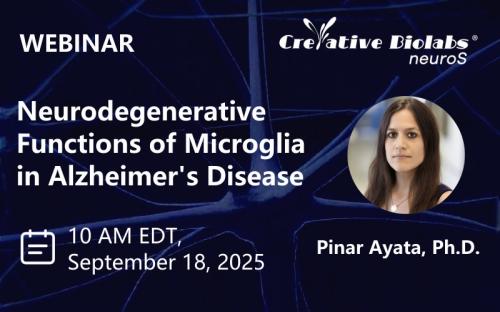Creative Biolabs, a global leader in neuroscience research, is proud to introduce innovative platforms that advance discoveries in neurodegenerative disease research.
Microglia, the resident immune cells in the brain, continue to emerge as critical players in the progression of Alzheimer's disease. The recent findings from Dr. Pinar Ayata's lab—highlighted in an upcoming Creative Biolabs webinar on September 18th, 2025, at 10 AM EDT—demonstrate that a subset of microglia activated by the integrated stress response (ISR) contributes to synapse loss leading to neurodegeneration, using experimental models of AD. Specifically, the Ayata lab has shown that ISR-activated microglia secrete toxic lipids, which promote pathological processes—findings that provide therapeutic possibilities in targeting the stress signaling in microglia.

To facilitate this area of research, Creative Biolabs has developed a comprehensive catalog of microglial cell lines for neuroinflammation, neurodevelopment, and disease modeling--the catalog encompasses using primary microglia sourced from human, mouse, and rat, in addition to using immortalized lines: BV-2, N9, HMC3, and HAPI.
"Our microglia products are designed to provide researchers with high-purity, ready-to-go tools to accurately model neurodegenerative diseases," said a representative. "We offer so much flexibility and reliability studying cytokine release, synaptic pruning, or drug screening."
In addition to these cellular tools, Creative Biolabs has an Alzheimer's disease in vitro modeling service that combines iPSC-derived neurons, astrocytes, and microglia with bioengineered platforms, including 3D organoids and microfluidic blood-brain barrier models that allow modeling of defining features of AD, including amyloid-beta plaque development, hyperphosphorylation of tau protein, and chronic neuroinflammation, all while maintaining controlled and reproducible conditions.
Further assays can also identify levels of Aβ and tau pathology, yield details on synaptic integrity, and identify inflammatory cytokines and the level of oxidative stress. The platform also supports large volumes of therapeutic compound screening, with a focus on microglial activation and neuroimmune mechanisms.
Website: https://neuros.creative-biolabs.com/
Email: [email protected]